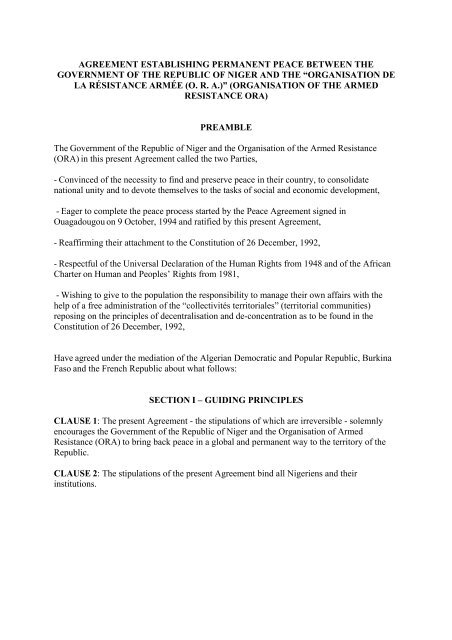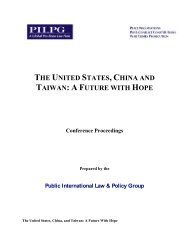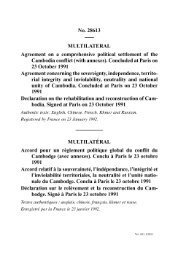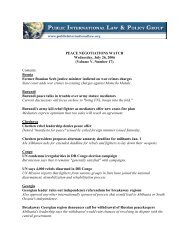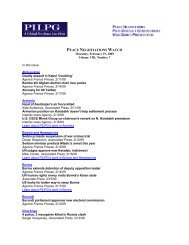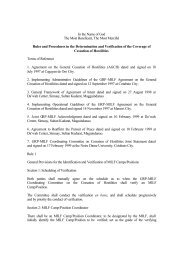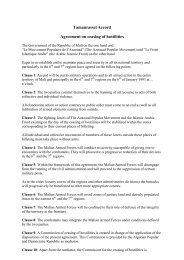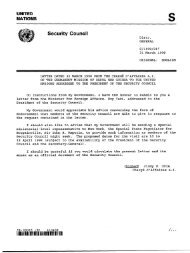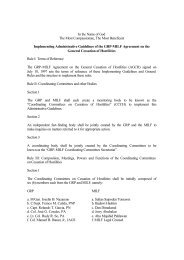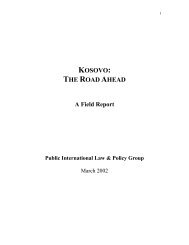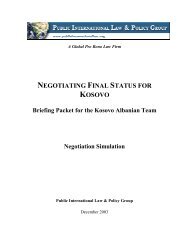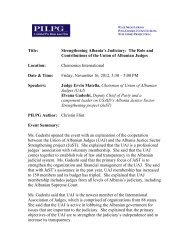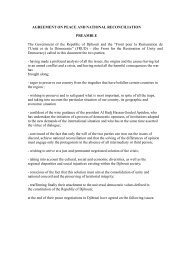agreement establishing permanent peace between the government ...
agreement establishing permanent peace between the government ...
agreement establishing permanent peace between the government ...
Create successful ePaper yourself
Turn your PDF publications into a flip-book with our unique Google optimized e-Paper software.
AGREEMENT ESTABLISHING PERMANENT PEACE BETWEEN THEGOVERNMENT OF THE REPUBLIC OF NIGER AND THE “ORGANISATION DELA RÉSISTANCE ARMÉE (O. R. A.)” (ORGANISATION OF THE ARMEDRESISTANCE ORA)PREAMBLEThe Government of <strong>the</strong> Republic of Niger and <strong>the</strong> Organisation of <strong>the</strong> Armed Resistance(ORA) in this present Agreement called <strong>the</strong> two Parties,- Convinced of <strong>the</strong> necessity to find and preserve <strong>peace</strong> in <strong>the</strong>ir country, to consolidatenational unity and to devote <strong>the</strong>mselves to <strong>the</strong> tasks of social and economic development,- Eager to complete <strong>the</strong> <strong>peace</strong> process started by <strong>the</strong> Peace Agreement signed inOuagadougou on 9 October, 1994 and ratified by this present Agreement,- Reaffirming <strong>the</strong>ir attachment to <strong>the</strong> Constitution of 26 December, 1992,- Respectful of <strong>the</strong> Universal Declaration of <strong>the</strong> Human Rights from 1948 and of <strong>the</strong> AfricanCharter on Human and Peoples’ Rights from 1981,- Wishing to give to <strong>the</strong> population <strong>the</strong> responsibility to manage <strong>the</strong>ir own affairs with <strong>the</strong>help of a free administration of <strong>the</strong> “collectivités territoriales” (territorial communities)reposing on <strong>the</strong> principles of decentralisation and de-concentration as to be found in <strong>the</strong>Constitution of 26 December, 1992,Have agreed under <strong>the</strong> mediation of <strong>the</strong> Algerian Democratic and Popular Republic, BurkinaFaso and <strong>the</strong> French Republic about what follows:SECTION I – GUIDING PRINCIPLESCLAUSE 1: The present Agreement - <strong>the</strong> stipulations of which are irreversible - solemnlyencourages <strong>the</strong> Government of <strong>the</strong> Republic of Niger and <strong>the</strong> Organisation of ArmedResistance (ORA) to bring back <strong>peace</strong> in a global and <strong>permanent</strong> way to <strong>the</strong> territory of <strong>the</strong>Republic.CLAUSE 2: The stipulations of <strong>the</strong> present Agreement bind all Nigeriens and <strong>the</strong>irinstitutions.
SECTION II –TERRITORIAL AND ADMINISTRATIVE ORGANISATIONCLAUSE 3: The territorial subdivision, <strong>the</strong> organisation and <strong>the</strong> powers of <strong>the</strong> “collectivitésterritoriales” will be <strong>the</strong> ones defined by <strong>the</strong> law on <strong>the</strong> basis of <strong>the</strong> work of <strong>the</strong> specialcommittee in charge of reflecting on <strong>the</strong> administrative subdivision of <strong>the</strong> Republic of Niger,in accordance with <strong>the</strong> Peace Agreement signed in Ouagadougou on 9 October, 1994, in itssections I, II, III with <strong>the</strong> following wording:A/ TERRITORIAL SUBDIVISIONCLAUSE 4: The Republic of Niger is divided into administrative circumscriptions in <strong>the</strong>following way:- <strong>the</strong> Region- <strong>the</strong> Department- <strong>the</strong> Arrondissement- <strong>the</strong> MunicipalityCLAUSE 5: The Region, <strong>the</strong> Department and <strong>the</strong> Municipality are promoted into“collectivités territoriales” (territorial communities).CLAUSE 6: The creating and <strong>the</strong> limits of <strong>the</strong> “Collectivités territoriales” (Regions,Departments, Municipalities) and those of <strong>the</strong> Arrondissements are settled by <strong>the</strong> law onproposal of <strong>the</strong> special committee where <strong>the</strong> representatives of <strong>the</strong> CRA will be members.B/ THE ORGANISATION AND THE POWERS OF THE “COLLECTIVITÉSTERRITORIALES”CLAUSE 7: The “Collectivités territoriales” will be equipped with Councils or Assemblies,elected by direct universal suffrage and <strong>the</strong> Presidents elected within <strong>the</strong>m will be <strong>the</strong> head ofregional, departmental and communal executives.CLAUSE 8: Within <strong>the</strong> framework of <strong>the</strong>ir free administration, <strong>the</strong> elected Councils orAssemblies will govern <strong>the</strong>ir own affairs by deliberation in <strong>the</strong> fields planned by <strong>the</strong> lawwhich are for example <strong>the</strong> budget, <strong>the</strong> conception, <strong>the</strong> programming, <strong>the</strong> carrying out, <strong>the</strong>follow-up and <strong>the</strong> evaluation of actions of economic, social and cultural development havinga regional or a local interest.C/ REPRESENTATIVES OF THE STATE: THEIR POWERSCLAUSE 9: The representation of <strong>the</strong> State will be provided by:- one representative in <strong>the</strong> Region- one representative in <strong>the</strong> Department- one representative in <strong>the</strong> Arrondissement- one Mayor elected in <strong>the</strong> Municipality.The denomination of <strong>the</strong>se representatives will be determined by <strong>the</strong> law.
CLAUSE 10: The representatives of <strong>the</strong> State will have <strong>the</strong> following mission:a/ to supervise <strong>the</strong> application of <strong>the</strong> laws and regulations of <strong>the</strong> State within <strong>the</strong> limits of <strong>the</strong>territory of <strong>the</strong> administrative unit.b/ to guarantee <strong>the</strong> control of <strong>the</strong> lawfulness a posteriori of decisions and actions taken by <strong>the</strong>“collectivités territoriales”.c/ to give advice and assistance from technical State services to <strong>the</strong> “collectivitésterritoriales”, on <strong>the</strong>ir demand.SECTION III – RESTORATION OF PEACE AND NATIONAL RECONCILIATIONCLAUSE 11: A <strong>permanent</strong> cease-fire will come into force at zero hours (Niamey time) on <strong>the</strong>day after <strong>the</strong> signing of <strong>the</strong> present Agreement.CLAUSE 12: With a view to <strong>the</strong> establishment of <strong>permanent</strong> security, of <strong>the</strong> restoration andconsolidation of <strong>peace</strong>, <strong>the</strong> two Parties decide to create and to establish in Niamey, within twoweeks following <strong>the</strong> signing of this present Agreement, a Special Peace Committee composedof <strong>the</strong> two Parties, with both sides equally represented, and of <strong>the</strong> mediation. The total numberof members of this group cannot exceed 20, whereof 14 for <strong>the</strong> two Parties.The Presidency of <strong>the</strong> Special Peace Committee will be entrusted to <strong>the</strong> High Commissionerat <strong>the</strong> Restoration of Peace and <strong>the</strong> Vice-presidency will be entrusted to a representative of <strong>the</strong>ORA. Necessary means for <strong>the</strong> activity of <strong>the</strong> Committee will be taken care of by <strong>the</strong> State.The Committee will meet periodically. It could also be convened by its President on demandof one or <strong>the</strong> o<strong>the</strong>r of <strong>the</strong> Parties. At <strong>the</strong> meetings of <strong>the</strong> Committee, minutes will be taken.The Committee will have as its mission:1/ to supervise <strong>the</strong> application of <strong>the</strong> Agreement and <strong>the</strong> timetable established by it.2/ to ensure that <strong>the</strong> stipulations of <strong>the</strong> Agreement are widely spread and that <strong>the</strong>re is acampaign of explanation of it among <strong>the</strong> Nigerien population.3/ to supervise <strong>the</strong> execution of <strong>the</strong> disarmament operations and <strong>the</strong> recuperation of all arms,munitions and war material.4/ to determine <strong>the</strong> number of people before starting <strong>the</strong> integration work.Therefore, it will receive for example:- <strong>the</strong> list of demobilised elements of <strong>the</strong> ORA of which it will make a detailed calculation,- <strong>the</strong> list of arms, munitions and war material to be handed in and of which it will control <strong>the</strong>recuperation and <strong>the</strong> stocking and for which it will decide <strong>the</strong> destination.The Special Peace Committee will have under its authority a Group of military observers for<strong>the</strong> composition of which it will mainly appeal to <strong>the</strong> mediating countries.During its mandate <strong>the</strong> Group of military observers will have <strong>the</strong> following tasks:- to control <strong>the</strong> application of <strong>the</strong> cease-fire and to report its possible violations.- to control, within <strong>the</strong> framework of <strong>the</strong> present Agreement, <strong>the</strong> recuperation, <strong>the</strong> handing inand <strong>the</strong> stocking of arms.
advancement) will be determined by texts of regulations on <strong>the</strong> proposition of aninterdepartmental committee where representatives of <strong>the</strong> ORA also will be members.These units will have as <strong>the</strong>ir mission to guarantee <strong>the</strong> maintenance of order and of publicsecurity. Within <strong>the</strong> framework of <strong>the</strong>ir mission <strong>the</strong>y will have to act in coordination with andcomplementing <strong>the</strong> classical forces of defence and security.The personnel of <strong>the</strong>se units will be composed of demobilized elements from <strong>the</strong> ORA and ofpeople coming from <strong>the</strong> affected regions.B/ Armed Nigerien Forces and <strong>the</strong> National Police ForceWithin <strong>the</strong> framework of <strong>the</strong> restoration of <strong>peace</strong> and trust, <strong>the</strong> Government engages tointegrate within <strong>the</strong> army demobilized elements from <strong>the</strong> ORA who will receive appropriatetraining. These elements will sign an engagement in accordance with statuary stipulations.Moreover, within <strong>the</strong> framework of <strong>the</strong> annual recruitment, <strong>the</strong> contingent of recruits, comingfrom <strong>the</strong> zone affected by <strong>the</strong> conflict will be reviewed in a rising way.Therefore <strong>the</strong> statuary texts pertaining to that matter will be readjusted.Fur<strong>the</strong>rmore, on <strong>the</strong> proposition of <strong>the</strong> Interdepartmental Committee, <strong>the</strong> law 62-10 of March16 1962, already seen above at paragraph A/ of <strong>the</strong> present clause, will be submitted torevision by <strong>the</strong> National Assembly.C/ Paramilitary ForcesAccording to <strong>the</strong> existing texts <strong>the</strong> Government will integrate within <strong>the</strong> Paramilitary Forces(Republican Guard, National Police and Customs) demobilized elements from <strong>the</strong> ORA whowill receive appropriate training.For <strong>the</strong> sake of <strong>the</strong> protection of <strong>the</strong> environment, <strong>the</strong> fauna and <strong>the</strong> flora, special accent willbe put on <strong>the</strong> recruitment of local personnel.If necessary, arrangements will be taken to readjust <strong>the</strong> existing texts.SECTION V – ECONOMIC, SOCIAL AND CULTURAL DEVELOPMENTCLAUSE 18: Within <strong>the</strong> framework of <strong>the</strong> application of Clause 8 of <strong>the</strong> present Agreement,<strong>the</strong> Government will take all necessary measures, in <strong>the</strong> fields foreseen by <strong>the</strong> law, in order toprovide <strong>the</strong> “collectivités territoriales” with <strong>the</strong> free managing of <strong>the</strong>ir affaires in <strong>the</strong> activitiesof economic, social and cultural development of regional or local interest.CLAUSE 19: In order to allow <strong>the</strong> freely consented return and <strong>the</strong> reinsertion of displacedpersons, <strong>the</strong> Government, toge<strong>the</strong>r with <strong>the</strong> ORA, encourages friendly countries andinternational humanitarian organisations concerned to establish on one hand reception anddirection points, where <strong>the</strong> stay will be as brief as possible, and on <strong>the</strong> o<strong>the</strong>r hand reinsertionsites in which adequate social and economic activities will be developed.CLAUSE 20: In order to reinforce and to enlarge to <strong>the</strong> zone affected by <strong>the</strong> conflictactivities already undertaken within <strong>the</strong> framework of urgency assistance concerning food,health and schooling foreseen in <strong>the</strong> Peace Agreement of Ouagadougou, October 9 1994, <strong>the</strong>Government, toge<strong>the</strong>r with <strong>the</strong> ORA and concerned populations, engages to establish, on <strong>the</strong>basis of available statistics on displaced persons and of those already at home, <strong>the</strong> real needsof urgent help to be introduced in a global programme. This programme will be submitted by
<strong>the</strong> Government to donors at a timely moment.CLAUSE 21: Within <strong>the</strong> framework of <strong>the</strong> programme of social insertion of <strong>the</strong> demobilizedelements of <strong>the</strong> ORA, <strong>the</strong> Government will take steps in view of <strong>the</strong>ir recruitment in <strong>the</strong>projects of high intensity of labour in <strong>the</strong> zone affected by <strong>the</strong> conflict.CLAUSE 22: Without effect on <strong>the</strong> stipulations of Clause 8 of <strong>the</strong> present Agreement, <strong>the</strong>Government engages to take all necessary steps in order to continue and accelerate <strong>the</strong> effortsof investment in <strong>the</strong> pastoral zone through <strong>the</strong> use of new strategies of development aiming at:A. Within <strong>the</strong> field of rural development1- BreedingA policy of a profitable breeding taking into account:- animal health- reconstruction of <strong>the</strong> live stock- commercialisation of <strong>the</strong> cattle and products derived from breeding- introduction of transformation and conservation of products- better managing of <strong>the</strong> pasture land- adjustment of water-holes and multiplication of pastoral wells- constitution of cereal banks.2-AgricultureA development of <strong>the</strong> agricultural potentialities contained in <strong>the</strong> regions guaranteeing <strong>the</strong>irexploitation <strong>the</strong> whole year around and a local transformation of <strong>the</strong> products by:- technical assistance given to <strong>the</strong> farmers- support of help to <strong>the</strong> “collectivités”- commercialisation of agricultural products- combating noxious insects- creation of units of transformation and conservation of agricultural products- exploiting of underground water sources- streng<strong>the</strong>ning of market gardening potentialities through <strong>the</strong> use of hydro-agriculturalperimeters.B. Within <strong>the</strong> field of mining and industriesThe mines will remain a national treasure <strong>the</strong> benefits of which should make possible <strong>the</strong>development of all <strong>the</strong> regions. Therefore it is necessary to:- diversify <strong>the</strong> mining production.- develop <strong>the</strong> local raw material through industrialization.- favour <strong>the</strong> development of <strong>the</strong> regional economy through <strong>the</strong> establishment for <strong>the</strong> wholeindustrial and mining sector of measures encouraging <strong>the</strong> creation of jobs in favour of <strong>the</strong>local population which will benefit from a priority in recruitment.- transfer to “collectivités territoriales” one part of national resources generated by <strong>the</strong> miningand industrial exploitation. The rate and <strong>the</strong> forms of this transfer of resources will bedetermined by <strong>the</strong> law on decentralisation.C. Within <strong>the</strong> field of social and cultural development1- Health- rehabilitation of already existing infrastructures- reconstruction and equipment of new health centres- multiplication of drugstores and medicine stocks


